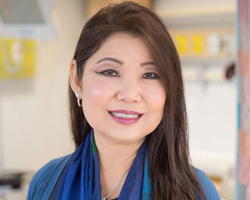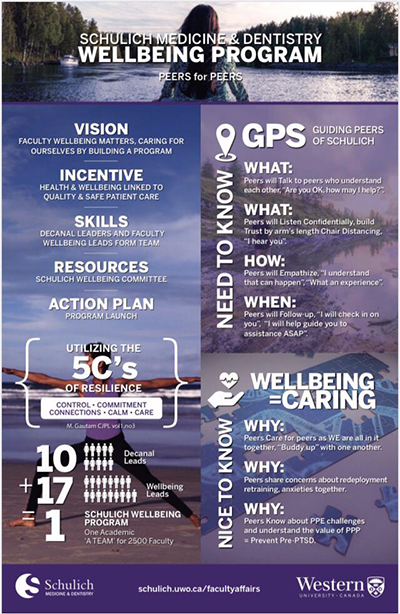Feature: Peer program supports clinician well-being
By Emily Leighton, MA’13
Physician burnout is a health care crisis that has been simmering for years. To help address the issue, Schulich Medicine & Dentistry is delivering a new program with the aim of better supporting clinician well-being.
Described by the National Academy of Medicine as “a workplace syndrome characterized by high emotional exhaustion, depersonalization and a low sense of accomplishment at work,” evidence suggests that burnout affects more than half of practising physicians.
Confronted with the COVID-19 pandemic, that number is expected to rise even higher.
 A survey published in JAMA in April identified new sources of anxiety and fear among physicians, including shortages of personal protective equipment (PPE), exposure to COVID-19 and increased risk to family members, access to adequate childcare and supporting personal and family needs.
A survey published in JAMA in April identified new sources of anxiety and fear among physicians, including shortages of personal protective equipment (PPE), exposure to COVID-19 and increased risk to family members, access to adequate childcare and supporting personal and family needs.
For Dr. Andrea Lum, Vice Dean, Faculty Affairs, the situation called for urgent action. “We needed to do something immediately to better support clinical faculty at the institutional level,” she said.
Appointed to her decanal role in January, Dr. Lum fast-tracked plans to implement a peer support program, moving from concept to fruition in just four weeks.
The resulting Peers for Peers Program at Schulich Medicine & Dentistry provides one-on-one peer support for clinical faculty, emphasizing empathetic listening and shared experience. It is the first program of its kind in Canada based at an academic centre.
To ensure psychological safety, the Program engages faculty members who are interested in well-being initiatives within the School’s 14 clinical departments, the Windsor Campus and Dentistry. Called Well-Being Leads, these faculty members are trained to provide emotional support and resources to their peers.
 In May and June, the Program supported 87 connections between Well-Being Leads and faculty members. Informal chats or check-ins accounted for about 60 per cent of the interactions.
In May and June, the Program supported 87 connections between Well-Being Leads and faculty members. Informal chats or check-ins accounted for about 60 per cent of the interactions.
“There is mounting evidence that these types of one-on-one conversations enhance wellness and build resilience,” said Dr. Lum. “With this approach, faculty can access the emotional support they need, but at a distance from leaders and their employer.”
As part of the Peers for Peers Program, Dr. Lum and the School’s Well-Being Committee also developed a training curriculum accredited by the Royal College of Physicians and Surgeons of Canada. Leveraging the expertise and resources available at Western University, training sessions were delivered via Zoom and covered a range of topics, from empathetic listening to recognizing peers in distress to implicit bias.
“We took a ‘train the trainers’ approach. We really want faculty members to feel empowered to lead the Program moving forward,” explained Dr. Lum. “The Well-Being Leads are now equipped to create a framework and continue training within their departments and divisions.”
Dr. Lum emphasizes that the Peers for Peers Program is part of the School’s larger approach to faculty well-being and experience. “We will continue to support and champion faculty, and to help them navigate their careers,” she said.








